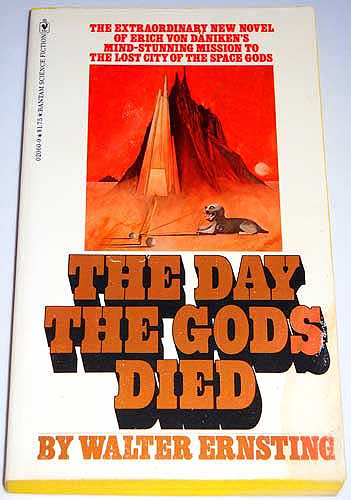 By WALTER ERNSTING (Bantam; 1971/76)
By WALTER ERNSTING (Bantam; 1971/76)
Anyone out there remember CHARIOTS OF THE GODS by Erich von Daniken? That book made quite a splash back in the late sixties and seventies, with its claims that humankind was descended from aliens who colonized the Earth thousands of years ago and then apparently left. Such ideas weren’t unique to von Daniken, having been previously floated by authors like Jacques Bergier and Robert Charroux (and H.P. Lovecraft), but it was CHARIOTS OF THE GODS, published in 1968, that really captured the public’s attention.
THE DAY THE GODS DIED serves as a sort of third party companion-piece to CHARIOTS, as well as a dispatch from an era in which allegedly true revelations of incredible events, such as THE THIRD MIND and the Carlos Castaneda books, were popular. The German science fiction novelist Walter Ernsting claims to have known von Daniken when he was writing CHARIOTS in the late sixties, the latter having made contact with Ernsting via a “psychic telegraph.”
Entrusted with a stone sphinx by his new friend von Daniken, who lacked the funds to put it to use, Ernsting travelled to Peru, which as CHARIOTS OF THE GODS readers are well aware was one of that book’s pivotal locations. It’s there that von Daniken claims aliens first landed on Earth and, according to Ernsting, created a vast chamber housing a time machine. The entrance to this chamber is via the stone sphinx, which serves as a key, and the time machine in good working order, so much so that it takes Ernsting back to the aliens’ initial landing. He learns that said aliens were illegal immigrants, having gone against the wishes of a galactic council charged with overseeing humanity and making sure our evolution occurs at a proscribed rate.
A bit later in the book, after travelling back to his native Germany, Ernsting describes another fateful journey. This one deposits him in Norway, where a magic mountain houses the galactic council, whose overseers Ernsting meets (and who conveniently speak his language). They keep constant watch on humanity’s doings through a multitude of TV monitors, in anticipation of the day when our intellect will finally catch up with our development and the aliens can show themselves. Von Daniken himself enters the action after finally publishing CHARIOTS OF THE GODS, and uses the money he makes from the book to travel to Peru and utilize the time machine himself, only, on his way back, to get thrown in jail (the reasons for which are left unexplained).
All this is presented in a frank and reportorial “nonfiction” manner, with Ernsting assuring us it’s all true. Yet the book’s American publisher has categorized it as science fiction, which I think is an entirely appropriate designation—although as such the book is only marginally satisfying. It’s lively and readable, at least, written with the heat of one desperate to Get The Word Out. I’m just not sure that Word is worthy of Ernsting’s efforts.
